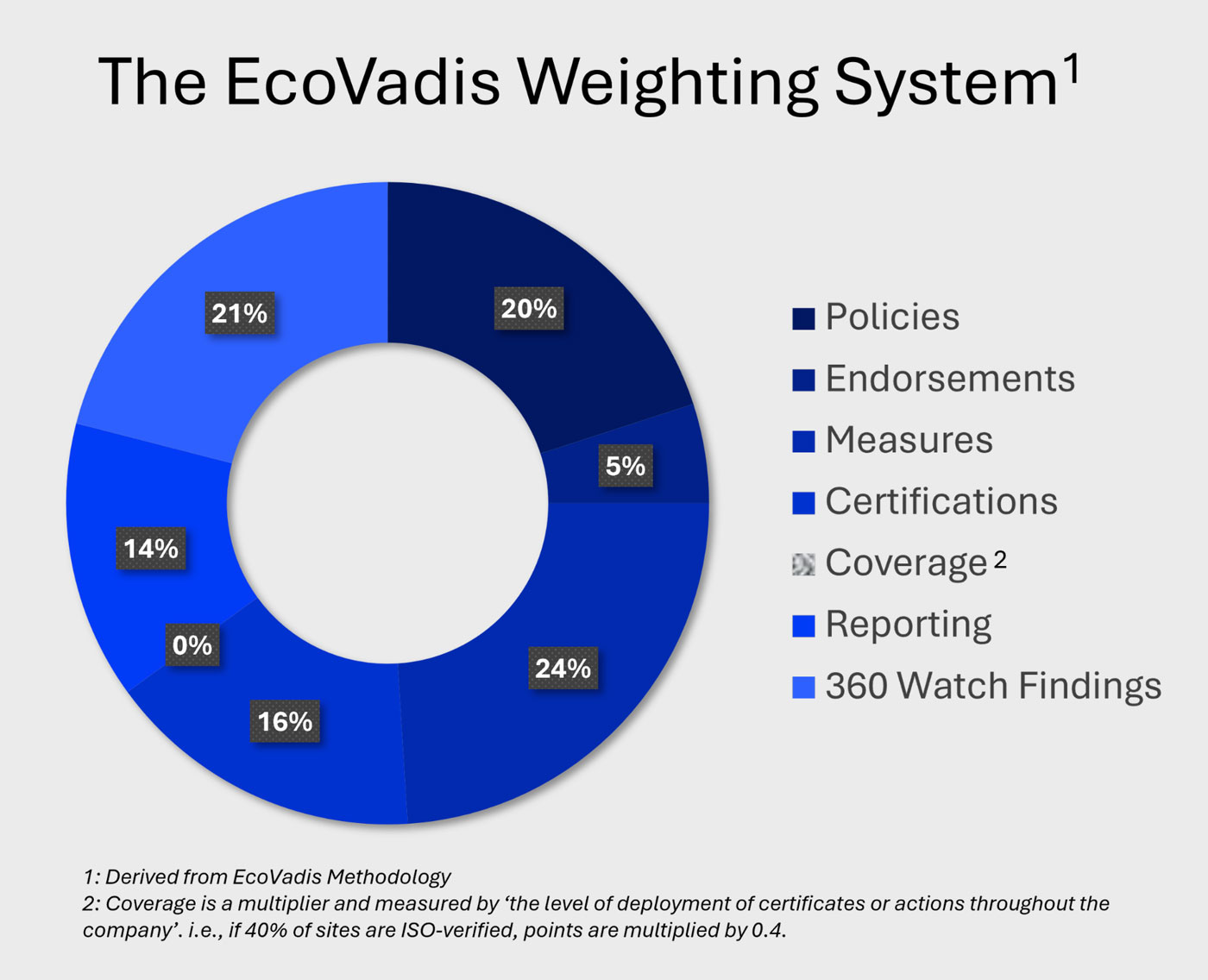Introduction
As businesses continue to navigate the complex terrain of ethical sourcing, environmental impact, and social responsibility, third-party ESG rating agencies are quickly growing in popularity among stakeholders as a tangible way to score companies across sectors and industries on even footing. One of the most widely used and accepted ESG rating agencies is EcoVadis, a third party assessment platform founded in 2007 which has assessed over 100,000 companies globally to date.
What is EcoVadis?
The EcoVadis assessment is inherently unique in its approach to scoring companies’ internal sustainability management systems. Compared to other prominent ESG rating agencies such as MSCI, Sustainalytics, and ISS ESG, which depend on publicly available data and examine ESG issues from the investor perspective (financial materiality or “outside-in”), the EcoVadis assessment concentrates on impact materiality or “inside-out,” examining how the company manages its sustainability impact.
An additional layer of the EcoVadis assessment is the ability to request suppliers to take the EcoVadis assessment, facilitating companies to not only examine their own sustainability management systems but also encourage their suppliers to do the same. This creates a platform for companies to integrate sustainability considerations into vendor selection, inherently placing value on suppliers with a higher sustainability focus, progress, and efforts.
Why does EcoVadis Matter?
EcoVadis’ cross-functionality has quickly made it the world’s largest provider of sustainability ratings for global value chains, driving resilience, sustainable growth, and positive impact. With businesses across more than 175 countries, EcoVadis’ wide reach includes well-known corporations such as Toyota, Amazon, Nestlé, Johnson & Johnson, L’Oréal, Unilever, LVMH, Bridgestone, and JPMorgan.
These corporations are increasingly using EcoVadis by assessing, managing, and integrating sustainability within their supply chains on one platform. As advisors, we see continued pressure on downstream suppliers (often privately held or private equity-owned companies) as more and more of their customers have started requiring suppliers to drive significant GHG emissions reductions, align with the Science-Based Targets initiative (SBTi), and often achieve a minimum EcoVadis score to remain favorable for vendor selection.
As the EcoVadis assessment continues to increase in popularity, breaking down its methodology and focusing on its key scoring drivers is crucial not only for scoring well in the first year but for continuous improvement over time.
How does the EcoVadis Assessment Work?
The EcoVadis assessment uses a scorecard system to evaluate companies’ management systems within four key pillars on a scale of 0 to 100, with 100 representing the highest level of sustainability performance. Within these four pillars are 21 sustainability criteria, which are weighted uniquely depending on the company’s industry, size, and geographic location:
-
Environment: Evaluates the company’s environmental management system, including policies, actions, and results related to environmental impact.
-
Labor & Human Rights: Assesses the company’s practices regarding labor conditions, human rights, and social issues.
-
Ethics: Reviews the company’s adherence to ethical business practices, including anti-corruption measures.
-
Sustainable Procurement: Examines the company’s approach to sustainable sourcing and supplier engagement.
All questions within the EcoVadis assessment need to be supported by official documents, broken down into three types: Policies, Actions, and Results. Attention to detail when gathering evidence is crucial, as failing to provide the right documentation that fulfills EcoVadis’ requirements can negatively impact your final rating and result in lost points despite having sufficient evidence in place.

EcoVadis Assessment: 4 Pillars covering 21 CSR issues.
The EcoVadis Assessment Process
The EcoVadis assessment process can be broken down into four main steps:
-
Data Collection: Gathering of formal, recent, and credible documentation that exists within the sustainability management system at least one month prior to the EcoVadis assessment.
-
Document Analysis: Once provided, EcoVadis’ sustainability analysts conduct a comprehensive document analysis and verify the company’s questionnaire responses.
-
Stakeholder Opinion: EcoVadis then facilitates external opinion through its 360 watch findings, live news monitoring, and external sustainability audits to identify positive and negative pieces of news.
-
Scoring Process: Information from the previous steps is summarized and a score of 0 to 100 is allocated to each management indicator in each sustainability pillar based on EcoVadis’ unique weighting system, as illustrated below:

The bulk of the time to complete this process is spent on the questionnaire and collecting appropriate documents and data. Depending on the level of rigor undertaken, completing the EcoVadis questionnaire can take companies anywhere from a few days to several weeks, depending on the business’s size, complexity, and sustainability maturity.
Once started, the questionnaire will accept responses up to a maximum of three weeks to final submission, with possible extensions incurring additional fees. The final rating is valid for 12 months, necessitating annual reassessment and continuous improvements as EcoVadis continues to raise the bar and incremental sustainability progress is made across the respondent network.
About Full Scope Insights & our EcoVadis Support Services
Full Scope Insights provides fit-for-purpose fractional CSO and ESG Program Management services. We specialize in developing and executing value-add sustainability strategies for public and private organizations in a cost-efficient manner. Our fractional resources provide our clients with flexibility in the way they structure their human capital needs and ESG program sensibly.
As it relates to EcoVadis, we are experts in undertaking the often-burdensome EcoVadis Sustainability Assessment on behalf of our clients, from the inaugural certification stage to reassessment. Our EcoVadis support approach includes:
-
Pre Assessment: Pre-assessment analysis to identify gaps within your EcoVadis assessment before submitting.
-
Questionnaire Response Support: Providing guidance and support with responses across EcoVadis’ complete questionnaire.
-
Documentation Review: Providing guidance on supplying EcoVadis-aligned policies, actions, and company results.
-
EcoVadis Gap Analyses: Analyzing your scorecard, identifying gaps, and providing a tailored action plan based on your sustainability priorities.
-
EcoVadis Implementation: Creating a sustainable management system aligned with EcoVadis’ criteria.
Contact us today to learn how we can support your EcoVadis assessment journey.
